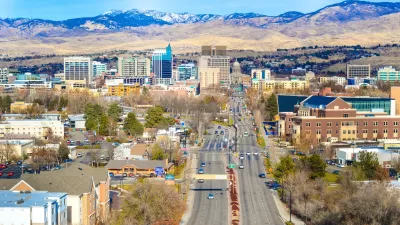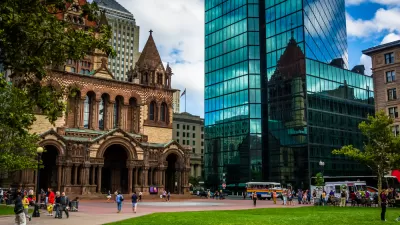Michelle Wu, Boston's new mayor, is ready to finally end the government powers that displaced communities in the mid-20th century.

In February, Boston Mayor Michelle Wu asked the City Council to end five of the city’s 14 active urban renewal plan areas, "with the goal of winding down all of the plans by the end of this year," reports Catherine Carlock for the Boston Globe.
"A powerful urban development tool granted to the then-Boston Redevelopment Authority in the late 1950s, urban renewal has been the city’s primary mechanism to take so-called 'blighted' property by eminent domain, and was key to the wholesale razing of the West End, Scollay Square, and parts of the South End and Roxbury in the 1950s and ′60s," explains Carlock.
Mayor Wu wrote a letter to the City Council explaining the rationale behind the request to end the city's urban renewal districts—connecting the contemporary urban renewal districts to their history as tools of displacement through "slum clearance" and other methods of a previous era of planning. "My administration is committed to putting equity at the forefront of planning and development decisions and the sunsetting of urban renewal in Boston should be viewed through this lens," wrote Wu in the letter.
As noted by Carlock, Wu campaigned on the issue of sunsetting the city's urban renewal districts, along with other larger structural reforms for the Boston Planning and Development Agency, so stay tuned for more reform developments.
FULL STORY: Wu says she’ll wind down Boston’s urban renewal districts. Here’s what that means.

Maui's Vacation Rental Debate Turns Ugly
Verbal attacks, misinformation campaigns and fistfights plague a high-stakes debate to convert thousands of vacation rentals into long-term housing.

Planetizen Federal Action Tracker
A weekly monitor of how Trump’s orders and actions are impacting planners and planning in America.

San Francisco Suspends Traffic Calming Amidst Record Deaths
Citing “a challenging fiscal landscape,” the city will cease the program on the heels of 42 traffic deaths, including 24 pedestrians.

Defunct Pittsburgh Power Plant to Become Residential Tower
A decommissioned steam heat plant will be redeveloped into almost 100 affordable housing units.

Trump Prompts Restructuring of Transportation Research Board in “Unprecedented Overreach”
The TRB has eliminated more than half of its committees including those focused on climate, equity, and cities.

Amtrak Rolls Out New Orleans to Alabama “Mardi Gras” Train
The new service will operate morning and evening departures between Mobile and New Orleans.
Urban Design for Planners 1: Software Tools
This six-course series explores essential urban design concepts using open source software and equips planners with the tools they need to participate fully in the urban design process.
Planning for Universal Design
Learn the tools for implementing Universal Design in planning regulations.
Heyer Gruel & Associates PA
JM Goldson LLC
Custer County Colorado
City of Camden Redevelopment Agency
City of Astoria
Transportation Research & Education Center (TREC) at Portland State University
Jefferson Parish Government
Camden Redevelopment Agency
City of Claremont





























